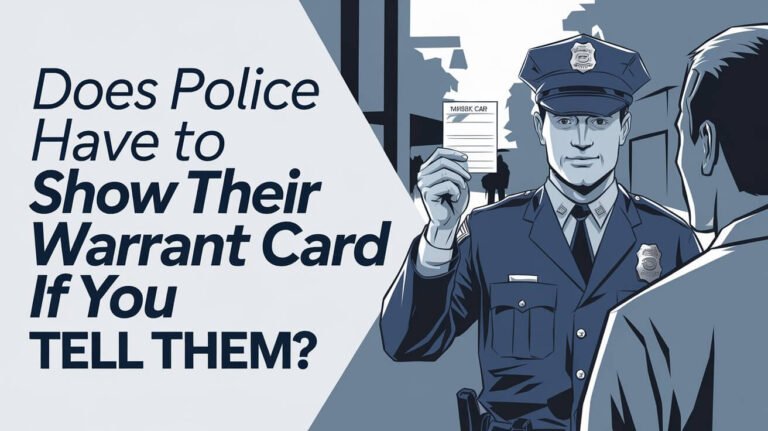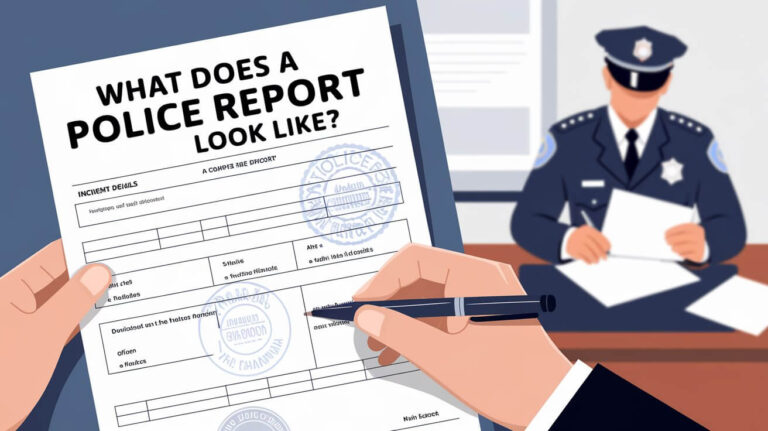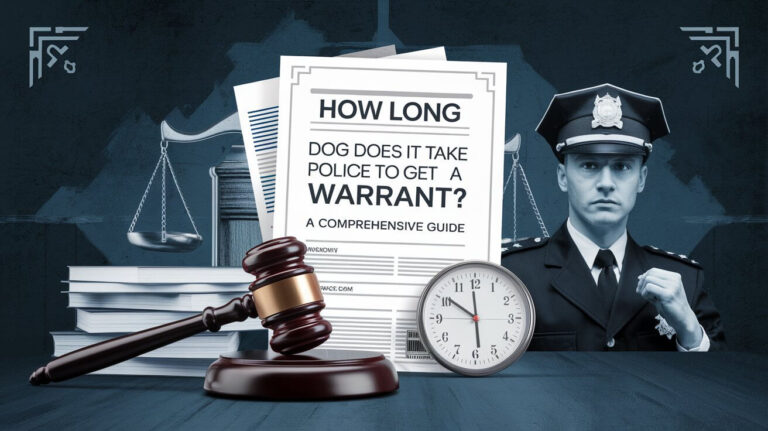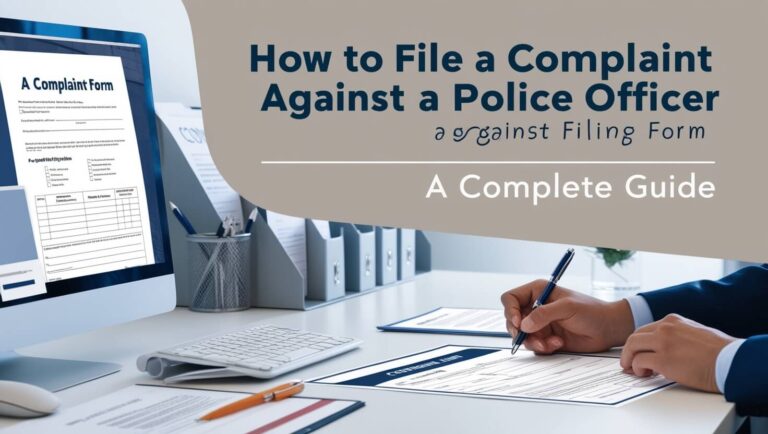Can Anyone Get a Copy of a Police Report? A Complete Guide
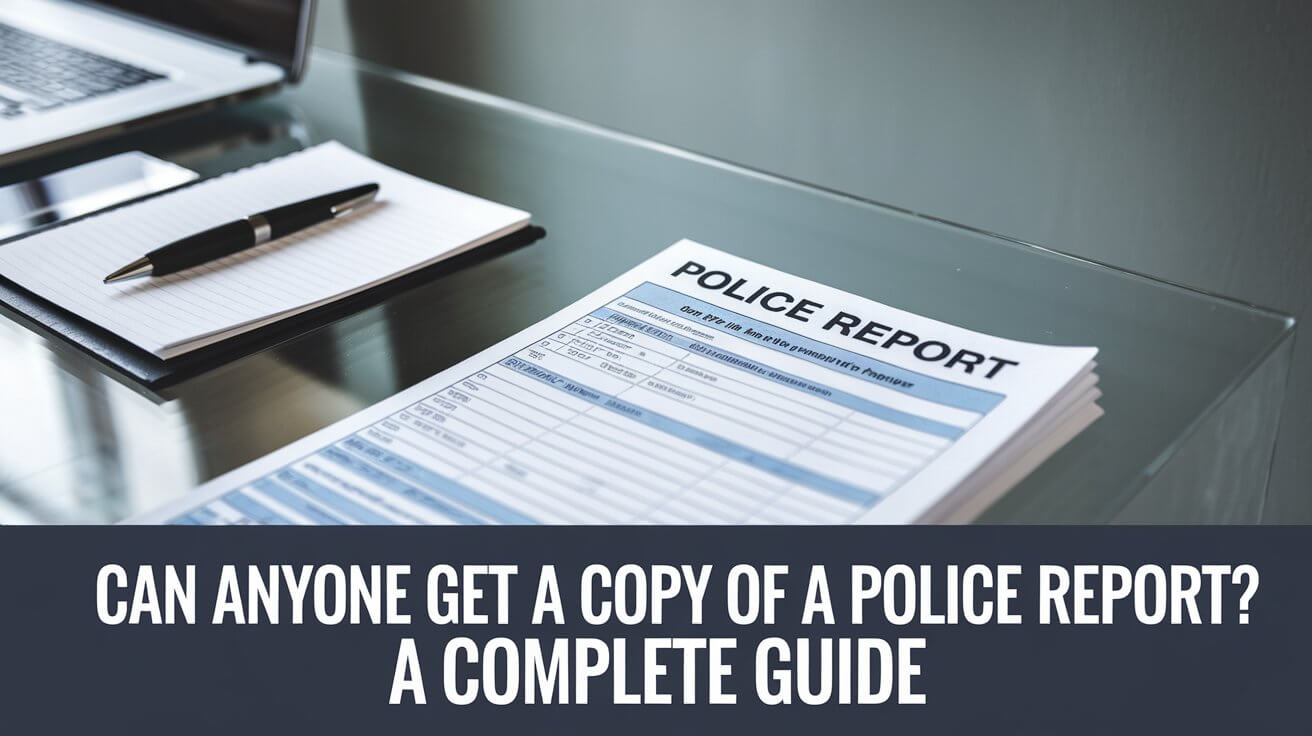
Police reports play a crucial role in documenting incidents and crimes. They serve as official records of events, often becoming key pieces of evidence in legal proceedings or insurance claims. Yes, in many cases, anyone can get a copy of a police report, but there are important exceptions and procedures to follow.
This guide will walk you through the ins and outs of obtaining police reports. We’ll cover who can request them, how to do it, and what to expect during the process. Whether you’re directly involved in an incident or simply curious about public records, you’ll find the answers you need here.
What Is a Police Report?
A police report is an official document created by law enforcement officers after responding to an incident or crime. These reports capture essential details about what happened, who was involved, and any evidence collected at the scene.
Police reports typically include:
- Date, time, and location of the incident
- Names and contact information of those involved
- Witness statements
- Officer observations
- Description of any injuries or property damage
- Initial findings or conclusions
These documents serve multiple purposes. They help law enforcement track crime patterns, provide crucial information for investigations, and offer an official record for insurance companies and courts.
Who Can Request a Police Report?
Many people assume that police reports are strictly confidential. However, in most cases, they’re considered public records. This means that various individuals and organizations can request copies.
Parties Directly Involved
If you were directly involved in an incident – as a victim, witness, or even the person accused of a crime – you have a clear right to request the police report. This access helps you understand how the incident was officially documented and can be useful for insurance claims or legal proceedings.
Legal Representatives
Lawyers often request police reports on behalf of their clients. Whether you’re facing charges or pursuing a civil case, your attorney may need this document to build your defense or support your claim.
Insurance Companies
After an accident or theft, your insurance company might ask for a copy of the police report. This helps them verify claims and determine coverage. In many cases, insurance companies have streamlined processes for obtaining these reports.
Members of the Public
Surprisingly, even if you weren’t involved in an incident, you can often still request a police report. This openness promotes transparency in law enforcement. However, keep in mind that some information might be redacted to protect privacy or ongoing investigations.
Reasons for Requesting a Police Report
People seek police reports for various reasons. Understanding these motivations can help you determine if you need to obtain one:
Insurance Claims
After a car accident or property crime, your insurance company will likely want to see the official police report. This document helps them verify the details of your claim and process it more quickly.
Legal Proceedings
In both criminal and civil cases, police reports often serve as key pieces of evidence. They provide an official account of what happened, which can be crucial in court.
Personal Records
Sometimes, people request police reports simply to have an accurate record of an incident for their own files. This can be especially important if you think you might need to reference the information in the future.
Background Checks
Some employers or landlords might request police reports as part of a background check. However, there are usually strict limitations on how this information can be used.
How to Obtain a Copy of a Police Report
The process of getting a police report can vary depending on your location and the agency involved. Here are the most common methods:
In-Person Requests
Many police departments allow you to request reports in person at their station. This can be the fastest way to get a report, especially for recent incidents.
Steps:
- Visit the police station where the report was filed
- Bring valid identification
- Provide any relevant information about the incident
- Pay any required fees
- Receive your copy (or wait for processing if it’s not immediately available)
Online Requests
More and more police departments are offering online options for requesting reports. This can be very convenient, especially if you’re not local to the area where the incident occurred.
Typical online process:
- Visit the police department’s website
- Look for a “Records” or “Report Request” section
- Fill out an online form with your information and details about the report
- Pay any fees electronically
- Receive the report via email or download it from a secure portal
Mail-In Requests
If you can’t visit in person and online options aren’t available, you can usually request a report by mail.
Mail-in request steps:
- Write a letter or fill out a request form (if available on the department’s website)
- Include all necessary information about the report and your identification
- Enclose a check or money order for any fees
- Send to the police department’s records division
- Wait for the report to arrive by mail (this can take several weeks)
Phone Requests
Some departments accept requests by phone, though this is becoming less common. If available, it’s usually best for simple inquiries or to start the request process.
Required Information for Requesting a Police Report
To successfully obtain a police report, you’ll need to provide specific details. Having this information ready will speed up the process:
Personal Identification
You’ll need to prove who you are when requesting a report. Acceptable forms of ID usually include:
- Driver’s license
- State-issued ID card
- Passport
- Military ID
Incident Details
The more information you can provide about the incident, the easier it will be to locate the correct report:
- Date and time of the incident
- Location where it occurred
- Names of people involved
- Type of incident (e.g., traffic accident, theft, assault)
- Report number (if you have it)
Reason for Request
Some departments may ask why you’re requesting the report. This helps them determine if you have a right to access the information and if any parts need to be redacted.
Costs Associated with Obtaining Police Reports
While some departments provide reports for free, many charge a fee. These fees help cover the cost of processing and copying the documents.
Fee Structures
Fees can vary widely depending on the department and the type of report:
- Simple reports: Often $5 to $20
- More complex reports (like accident reconstructions): Can be $50 or more
- Additional fees for certified copies or rush processing
Payment Methods
Most departments accept multiple forms of payment:
- Cash (for in-person requests)
- Check or money order
- Credit or debit card (especially for online requests)
Fee Waivers
Some departments offer fee waivers in certain situations:
- Victims of violent crimes
- Low-income individuals
- Requests from other government agencies
Always check with the specific department about their fee structure and waiver policies.
Timeframes for Receiving Police Reports
The time it takes to get a police report can vary greatly. Several factors influence the processing time.
Standard Processing Times
On average, you can expect:
- 1-5 business days for recent, simple reports
- 2-4 weeks for older or more complex reports
Expedited Services
Some departments offer faster processing for an additional fee. This can cut the wait time down to 1-3 business days in many cases.
Factors Affecting Processing Time
Several things can impact how quickly you receive a report:
- Age of the report (older reports may take longer to retrieve)
- Complexity of the incident
- Current workload of the records division
- Whether the report needs redaction
- If the investigation is ongoing
Restrictions on Accessing Police Reports
While many police reports are public records, there are situations where access may be limited or denied.
Ongoing Investigations
If a case is still active, the police may withhold the report to protect the integrity of their investigation.
Juvenile Cases
Reports involving minors are often confidential to protect the privacy of young people involved in the legal system.
Sensitive Information
Reports containing details about sexual assaults, domestic violence, or other sensitive crimes may have restricted access.
Privacy Laws
Various state and federal laws limit what information can be released in police reports. This often leads to redaction of personal details.
Redacted Information in Police Reports
When you receive a police report, you might notice some information is blacked out or removed. This process, called redaction, protects sensitive details.
Types of Information Typically Redacted
Common redactions include:
- Social Security numbers
- Driver’s license numbers
- Phone numbers and addresses of victims or witnesses
- Names of juvenile offenders
- Details about confidential informants
Reasons for Redaction
Redactions serve several purposes:
- Protecting personal privacy
- Ensuring witness safety
- Preserving the integrity of ongoing investigations
- Complying with legal requirements
Challenging Redactions
If you believe information was improperly redacted, you can usually appeal the decision. This often involves:
- Submitting a written request for review
- Explaining why you believe the redaction was unnecessary
- Waiting for a decision from a supervisor or legal department
Keep in mind that successful challenges are relatively rare, as most redactions are done for legally valid reasons.
Differences in Police Report Access Across Jurisdictions
The rules for accessing police reports aren’t uniform across the United States. They can vary significantly from one place to another.
State-by-State Variations
Each state has its own laws governing public records, including police reports. For example:
- Some states consider all police reports public records
- Others restrict access to only those directly involved in the incident
- A few states require a court order for any access to police reports
Local vs. State Police Reports
The process for obtaining reports can differ between local police departments and state law enforcement agencies:
- Local departments often have more streamlined processes
- State agencies might have more formal procedures and longer wait times
Federal Law Enforcement Reports
Reports from federal agencies like the FBI or DEA have their own set of rules:
- Often require Freedom of Information Act (FOIA) requests
- Can have much longer processing times
- May be heavily redacted due to national security concerns
Alternatives When Access is Denied
If your request for a police report is denied, you’re not necessarily out of options.
Freedom of Information Act (FOIA) Requests
For federal agencies, or in states with similar laws, you can file a formal FOIA request:
- Submit a written request detailing the specific information you’re seeking
- Be prepared for a potentially lengthy process
- You may need to pay fees for searching and copying records
Legal Assistance
Sometimes, involving a lawyer can help:
- They can argue for your right to access the information
- In some cases, they may be able to subpoena the records as part of legal proceedings
Appeals Process
Most agencies have an appeals process for denied requests:
- Submit a written appeal explaining why you believe the denial was incorrect
- Provide any additional information supporting your right to access the report
- Be prepared to wait for a review by a higher-level official
Digital vs. Physical Copies of Police Reports
In today’s digital age, you have options when it comes to the format of your police report.
Pros and Cons
Digital copies:
- Easy to store and share
- Often delivered more quickly
- Environmentally friendly
- Require digital security measures
- May not be accepted in all situations (some courts still prefer physical copies)
Physical copies:
- Tangible evidence for court or insurance purposes
- Don’t require technology to access
- Can be lost or damaged
- Take up physical space
Availability
Not all departments offer both options. Check with the specific agency to see what’s available.
Security Considerations
Whether digital or physical, treat police reports as sensitive documents:
- Store them securely
- Be cautious about sharing the information
- Shred physical copies when no longer needed
- Use password protection for digital files
Using Police Reports
Once you have a police report, it’s important to know how to use it effectively.
Legal Proceedings
In court, police reports can:
- Refresh an officer’s memory about an incident
- Provide a timeline of events
- Offer details about evidence collected
Remember, police reports are often considered hearsay in court, so they may not be admissible as direct evidence.
Insurance Claims
For insurance purposes, police reports:
- Provide an official account of what happened
- Help determine fault in accidents
- Can speed up the claims process
Always submit the police report promptly to your insurance company when filing a claim.
Personal Safety Planning
In cases of harassment or threats, police reports can:
- Establish a pattern of behavior
- Support requests for restraining orders
- Help you develop a safety plan with law enforcement
Common Myths About Accessing Police Reports
There’s a lot of misinformation out there about police reports. Let’s clear up some common misconceptions:
Myth: Only victims can get police reports.
Fact: In many cases, anyone can request a police report, though some information may be redacted.
Myth: All police reports are free.
Fact: Many departments charge fees for reports, especially for copies or certified versions.
Myth: You can get any police report immediately.
Fact: Processing times vary, and some reports may be withheld due to ongoing investigations.
Myth: Everything in a police report is 100% accurate.
Fact: Reports can contain errors or subjective interpretations. They’re a starting point, not the final word.
Tips for Successfully Obtaining Police Reports
To make the process of getting a police report as smooth as possible, keep these tips in mind:
- Act quickly: The sooner you request a report, the easier it is to obtain.
- Be polite: Treating records staff with respect can go a long way.
- Provide as much information as possible: The more details you give, the faster they can find your report.
- Follow up: If you haven’t heard back in a reasonable time, don’t hesitate to check on the status of your request.
- Know your rights: Familiarize yourself with your state’s public records laws.
- Be prepared to pay: Have payment ready in the form the department accepts.
- Consider alternatives: If you can’t get the full report, ask if a summary or incident log is available.
Understanding how police reports work and knowing your rights helps you get the information you need. This knowledge is useful for personal incidents, insurance claims, or accessing public records.
The process may seem challenging initially, but it’s essential for open law enforcement. Ask questions and clarify any confusion. Stay patient and persistent to get the police reports you need.

